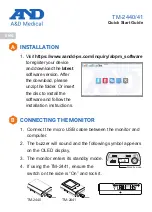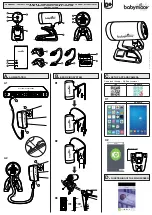
6
1. Open the battery compartment
AT
at the back of the instrument.
2. Replace the batteries – ensure correct polarity as shown by the
symbols in the compartment.
3. To set date and time, follow the procedure described in
«Section 3.».
The memory retains all values although date and time must
be reset – the year number therefore flashes automatically
after the batteries are replaced.
Which batteries and which procedure?
Use 4 new, long-life 1.5V, size AA batteries.
Do not use batteries beyond their date of expiry.
Remove batteries if the instrument is not going to be used
for a prolonged period.
Using rechargeable batteries
You can also operate this instrument using rechargeable batteries.
Only use «NiMH» type reusable batteries.
Batteries must be removed and recharged when the flat
battery symbol appears. They should not remain inside the
instrument as they may become damaged (total discharge as
a result of low use of the instrument, even when switched off).
Always remove the rechargeable batteries if you do not
intend to use the instrument for a week or more.
Batteries cannot be charged in the blood pressure monitor.
Recharge batteries in an external charger and observe the
information regarding charging, care and durability.
9. Using a Mains Adapter
You can operate this instrument using the Microlife mains adapter
(DC 6V, 600mA).
Only use the Microlife mains adapter available as an orig-
inal accessory appropriate for your supply voltage, e.g. the
«Microlife 230V adapter».
Ensure that neither the mains adapter nor the cable are
damaged.
1. Plug the adapter cable into the mains adapter socket
8
in the
blood pressure monitor.
2. Plug the adapter plug into the wall socket.
When the mains adapter is connected, no battery current is
consumed.
10. Error Messages
If an error occurs during the measurement, the measurement is
interrupted and an error message, e.g. «
ERR 3
», is displayed.
* Please consult your doctor, if this or any other problem occurs
repeatedly.
If you think the results are unusual, please read through the
information in «Section 1.» carefully.
Error
Description Potential cause and remedy
«
ERR 1
» Signal too
weak
The pulse signals on the cuff are too
weak. Re-position the cuff and repeat the
measurement.*
«
ERR 2
» Error signal During the measurement, error signals
were detected by the cuff, caused for
instance by movement or muscle tension.
Repeat the measurement, keeping your
arm still.
«
ERR 3
» No pres-
sure in the
cuff
An adequate pressure cannot be gener-
ated in the cuff. A leak may have
occurred. Check that the cuff is correctly
connected and is not too loose. Replace
the batteries if necessary. Repeat the
measurement.
«
ERR 5
» Abnormal
result
The measuring signals are inaccurate
and no result can therefore be displayed.
Read through the checklist for performing
reliable measurements and then repeat
the measurement.*
«
ERR 6
» MAM Mode There were too many errors during the
measurement in MAM mode, making it
impossible to obtain a final result. Read
through the checklist for performing reli-
able measurements and then repeat the
measurement.*
«
HI
»
Pulse or cuff
pressure too
high
The pressure in the cuff is too high (over
300 mmHg) OR the pulse is too high (over
200 beats per minute). Relax for 5
minutes and repeat the measurement.*
«
LO
»
Pulse too
low
The pulse is too low (less than 40 beats
per minute). Repeat the measurement.*
Содержание BP A200 AFIB
Страница 33: ...31 BP A200 Afib SV...
Страница 41: ...39 BP A200 Afib FI...
Страница 49: ...47 BP A200 Afib DA...
Страница 57: ...55 BP A200 Afib NO...
Страница 73: ...71 BP A200 Afib LT...
Страница 81: ...79 BP A200 Afib EE...
Страница 83: ...81 BP A200 Afib RU 1 2 AFIB AFIB AFIB Microlife MAM 3 MAM MAM 4 5 AFIB MAM 6 7 8 9 10 11 12 13 1 o a e...
Страница 87: ...85 BP A200 Afib RU 2 3 3 3 help 7 M 2 M AS M 17 17 M M 200 M CL M CL 8 AR AR 1 AT 2 3 3 4 1 5 AA oc a NiMH...









































